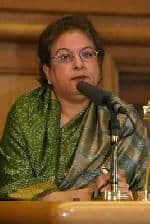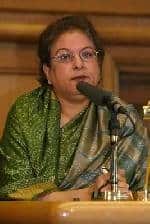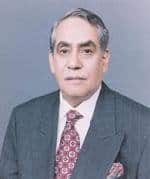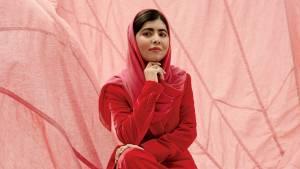Human Rights Defenders Hina Jilani
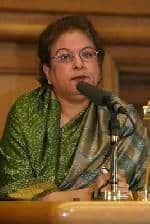
Hina Jilani born 1953 is an advocate of the Supreme Court of Pakistan and a human-rights activist from Lahore in Punjab, Pakistan.
Work.Hina Jilani is a lawyer and civil society activist and active in the movement for peace, human rights and women’s rights in Pakistan for the last three decades, she specializes in human rights litigation, and is especially concerned with the human rights of women, children, minorities, bonded and child labour.She is internationally recognized for her expertise in critical human rights investigations. She was the 2008 recipient of the Editor’s Award for Outstanding Achievement by The Lawyer Awards.
She is younger sister of Asma Jahangir.She is younger sister of Asma Jahangir.
Jilani is internationally recognized for her expertise in critical human rights investigations. She started practising law in 1979, when Pakistan was under martial law. In February 1980 with her sister Asma Jahangir, she co-founded Pakistan’s first all-female legal aid practice, AGHS Legal Aid Cell (ALAC) in Lahore. Initially the activities were confined to providing legal aid to women, but gradually these activities increased to including legal awareness, education, protection from exploitation, legal research, counseling and providing legal assistance as well. She is also one of the founders of the Human Rights Commission of Pakistan and the Women’s Action Forum (WAF) (a pressure group established in 1980 campaigning against Pakistan’s discriminatory legislation) and also founded Pakistan’s first legal aid center in 1986 In addition to providing pro bona legal aid, she has also helped set up a shelter for women fleeing violence and abuse, called Dastak in 1991. In addition to managing a shelter, Dastak also organizes workshops to create awareness of human rights and the protection of women.
A lawyer and civil society activist and active in the movement for peace, human rights and women’s rights in Pakistan for the last three decades, she specializes in human rights litigation, and is especially concerned with the human rights of women, children, minorities, bonded and child labour, political and other prisoners. She has conducted several cases which have become landmarks in setting human rights standards in Pakistan. Her battle for the rights of children, especially the protection of child laborers engaged in hazardous work, led to the promulgation an act regulating the employment of children in 1991.
Threats
As a result of their work in the field of women’s activism, received Jilani and Jahangir, was arrested and threatened with death, and facing hostile propaganda, intimidation, and abuse of public and attempts to kill themselves and after family.1999 represent a bracelet Samia, a young woman was seeking a divorce from her abusive husband, The Jilani Jahangir and again subject to death threats. Came the mother of Semitic armed with an office on the pretext of seeking a reconciliation with her daughter. And a gunman shot dead Semitism and fired at Hina, who managed to escape. Again, the gunmen entered her house and threatened members of her family. It was the same away from home: threats by the pressure to migrate, but they refused, and continues to live and work in Lahore.
Meet The Featured Human Rights Defenders
If Hina Jilani says the situation is bad, people should sit up and take notice.
As special representative of the U.N. secretary-general on human rights defenders for eight years and a prominent lawyer and civil society activist in Pakistan for the last two decades, she has worked tirelessly on an agenda for peace without flinching.
Yet the problems facing Pakistan today appear insurmountable even by her superhuman standards. “This is the first time in 30 years that I feel absolutely overwhelmed,” she says. “Not defeated, but overwhelmed.”
And the prospect that has Ms. Jilani so intimidated? Imagine a Yugoslavia-like situation in the world’s sixth-largest country, but this time with jihadi extremists, unknown numbers of foreign terrorists, and a nuclear stockpile thrown into the mix.
She calls the current civilian government of Asif Zardari the “last bastion” for a stable Pakistan and warns that if military rule returns, the nation of 172 million will split into opposing factions. “If the military comes back, the country will break because there are smaller provinces that will not tolerate another (period of) military rule, and they will secede – and if that happens, there will be Balkanization.”
Such a situation is not a remote possibility. Ms. Jilani explains the scenario in which one domino falls after another, leading to political and social catastrophe.
First, the United States continues the bombing of populations in the northwestern tribal regions of the country. This, combined with terrorist attacks in retaliation for the bombing, undermines already fragile economic conditions and creates an environment in which terrorists are able to proliferate further. Then, extremist elements in the Pakistani military with close ties to tribal chiefs accuse the civilian government of undermining national security by allowing the United States to indiscriminately kill civilians. A coup is staged reinstating military rule, and moderate provinces begin to break away from Pakistan. Political chaos ensues, creating an anarchic environment in which a familiar cycle of violence begins.
“There is a real danger of this occurring. The military have an agenda of supporting the extremists and are ideologically very akin to the extremists,” says Ms. Jilani. “It is very important that the world understand how important it is to act in a wise way,” she says.
So how did Pakistan get to this point? To be sure, the contested region of Kashmir has always been an issue, but in the 1980s and ’90s, the nation was better-known for its cricket team than for its problems with extremism.
Today’s situation traces its roots back some 20 years or more. When the Soviet pullout ended the Afghan war in 1989, the Pakistani military decided to use the fanatical elements left over from the struggle against the U.S.S.R. to further its security interests in Kashmir and so encouraged these groups to infiltrate the disputed northern province.
Hina Jilani Pictures
|
|
|
